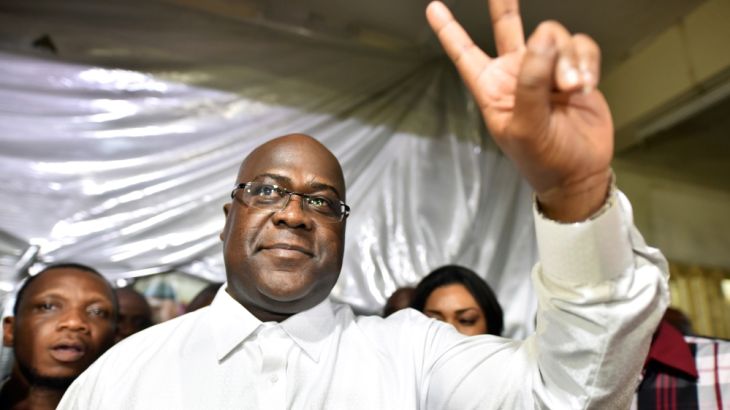Regional body SADC calls for DR Congo election vote recount
SADC says Kinshasa should recount votes of the disputed December 30 election and form a national unity government.

The Democratic Republic of Congo should recount the votes of its contested presidential election that the runner-up says was rigged, the Southern African Development Community (SADC) said.
“A recount would provide the necessary reassurance to both winners and losers,” SADC said in a statement on Sunday.
The 16-member bloc recommended a government of national unity including parties representing Kabila, Fayulu and Tshisekedi that could promote peace.
Members of the regional body include Angola and South Africa, old allies of President Joseph Kabila, who has ruled the central African country for the last 17 years.
“SADC draws the attention of Congolese politicians to similar arrangements that were very successful in South Africa, Zimbabwe and Kenya” that created the “necessary stability for durable peace,” the statement said.
The December 30 poll was supposed to mark Congo’s first uncontested democratic transfer of power since the mineral-rich country gained independence from Belgium in 1960.
But runner-up Martin Fayulu claims that he, in fact, won by a landslide and that the official winner, opposition leader Felix Tshisekedi, struck a deal with Kabila to be declared the victor. Tshisekedi and Kabila deny this.
Congo’s Catholic Church has said that tallies compiled by its 40,000-strong monitoring team show a different winner to those announced by the electoral commission, without saying who.
The opposition leader has challenged the provisional results in the country’s constitutional court, which is expected to announce its verdict in the coming days.
Here’s a recap of the developments, as political uncertainty grows in the wake of contested election results:
Vote delay
Polls were first scheduled to be held in 2016 but the electoral commission delayed the vote citing lack of resources. The poll body (CENI) also said it needed more time to complete voter registration in the vast country roughly the size of Western Europe.
The delay led to deadly street protests leading to the deaths of dozens of opposition supporters. After almost two years of delay, the election was announced to be held on December 23, 2018.
Another delay
Two days before polls were scheduled to take place, CENI dropped another bombshell: polls will be delayed by a week.
CENI said it was not prepared to hold the elections following a fire that destroyed voting machines as well as the deadly Ebola outbreak in the country’s east.
No voting in three cities
Four days before polling date, the election commission said voting will not be taking place in the eastern cities of Beni and Butembo due to ongoing Ebola outbreak, while election in the western city of Yumbi was postponed because of violence. All three cities were opposition strongholds.
Results delay
On January 6, when the provincial results were to be declared, CENI said it was postponing the announcement saying commission had only about half of the vote tally sheets.
‘Major irregularities’
SYMOCEL, a Congo-based observer mission, said it had witnessed 52 “major” irregularities in the 101 of the 179 vote-counting centres it observed, including people tampering with results.
Disputed results
Hours after results were announced on Thursday, opposition leader Martin Fayulu rejected and appealed to the Constitutional Court to annul the provisional result.
Fayulu filed a fraud complaint on Saturday with Congo’s highest court, which has eight days to rule on the case.
France and Belgium are also challenging the outcome of the election, with France’s foreign minister saying the declared victory of opposition candidate Felix Tshisekedi was “not consistent” with the results and that his rival Martin Fayulu appeared to have won.
The swearing-in of the new president is planned for January 18.